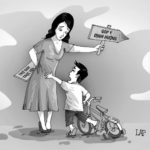Teach children to take responsibility
Parents should educate children on how to take responsibility for their mistakes. The moment a child makes a mistake is an opportunity to teach them. If parents teach their children affectionately at this time, the children will become better and better.
There is a story that when President Reagan was a child, he collected some banned fireworks and distributed them. He was caught by the police and had to pay a fine of $12.5. At that time, one dollar could buy 10 laying hens, equivalent to 125 hens. This was a large amount of money and Reagan couldn’t afford it.

His father knew about this, but he didn’t scold or hit his son. He just told Reagan, “The family has money, but this time I can’t give it to you. You have to take responsibility for your mistake. I will temporarily lend you $12.5, but it must be returned after a year.” To repay his debt to his father, Reagan worked hard outside of school to earn money.
After more than half a year of hard work, Reagan finally earned $12.5 and proudly placed it in his father’s hands. Reagan’s father patted him on the shoulder and said, “A man who can take responsibility for his mistakes will be rewarded in the future.” Later, Reagan became president and wrote in his memoir about this: What does it mean to take responsibility for one’s mistakes? When a child makes a mistake, let the child bear the consequences and increase the cost of the child’s mistakes. When they are young, children cannot distinguish right from wrong, only parents can understand that and teach them.
Let children participate in household chores from a young age
Parents need to encourage children to participate in household chores from a young age. Regularly involving children in activities such as cleaning the room, doing the laundry, cooking, or taking care of pets will help them learn valuable lessons in life.
Parents should be aware that wrapping everything up and not allowing children to get involved in anything is a big mistake. The case of child prodigy Wei Yong Khang has shown that in addition to having high academic achievements, children need to be guided in self-care and household chores.

Ultimately, the purpose of education is to help children have a better life. Participating in household chores will help children learn many valuable skills and qualities, thereby developing better in life.
Encourage children to study hard
Parents need to encourage their children to study hard, as it is the best way for children to achieve success and position themselves in the future.
Studying and reading books are effective ways to open new doors for children, providing them with the knowledge and skills needed to develop and grow. Parents have a responsibility to educate their children from a young age, encouraging them to study hard and have a passion for learning.
With a solid educational foundation, children will have critical thinking skills, problem-solving abilities, and become confident individuals who can meet the challenges of life. Furthermore, education also helps nurture a child’s beautiful soul, sensitivity, and awareness of the value of life.
Learning 12 Jewish Parenting Tips
Are you looking for ways to encourage your kids to reach their goals? Look no further! From the success of the relatively small Jewish population of only 13 million people – 40% of all Nobel Prize winners – we can learn some valuable lessons about parenting. Join Dien May XANH to discover 12 Jewish ways to teach children and help them make the most of their potential!





































